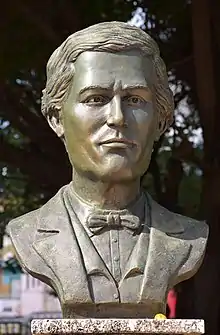Pedro Francisco Bonó
Pedro Francisco Bonó y Mejía (October 18, 1828 – September 13, 1906) was a Dominican politician, sociologist and intellectual. He is credited with being the first Dominican sociologist. He was the president of the Senate of the Dominican Republic in 1858.[1]
Pedro Francisco Bonó | |
|---|---|
 Bust of Pedro Francisco Bonó in Parque Independencia, Santo Domingo | |
| Born | Pedro Francisco Bonó y Mejía 18 October 1828 Saint-Yague, Haiti (now Santiago, Dominican Republic) |
| Died | 14 September 1906 (aged 77) San Francisco de Macorís, Dominican Republic |
| Nationality | Dominican |
Bonó was born in 1828, to Joseph Bonó (a ranchman and trader of Italian origin) and Inés Mejía y Port. His maternal grandmother, Doña Eugénie Port, a native of Brittany (North-Western France) who had large plantations and fortune in the Saint-Domingue until the outbreak of the Haitian Revolution, taught him the French language and fashioned him intellectually.[2]
A metro station in Santo Domingo is named after him.
Publications
- El Montero (1856)
- Apuntes para los Cuatro Ministerios de la República (1857)
- Apuntes sobre las Clases Trabajadoras Dominicanas (1881)
- Congreso Extraparlamentario (1895)
- Epistolario
- Ensayos Sociohistóricos
- Actuación Pública
- Papeles de Pedro Francisco Bonó (Works collected by Emilio Rodríguez Demorizi, 1963)
References
- Tejada, Adriano Miquel (12 May 1990). "Manual del legislador Dominicano". Universidad Católica Madre y Maestra.
- GUERRERO SÁNCHEZ, José Guillermo (July–December 2006). "Bonó: Precursor de la Historia Social Dominicana" (pdf). Clío (in Spanish). Santo Domingo: Academia Dominicana de la Historia (172): 180, 200. Retrieved 6 August 2014.
This article is issued from Wikipedia. The text is licensed under Creative Commons - Attribution - Sharealike. Additional terms may apply for the media files.